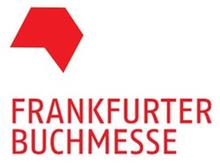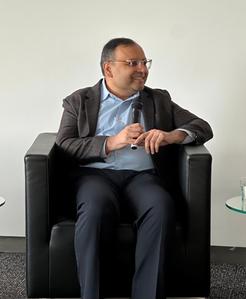 "When I look at the macro perspective, reading is extremely healthy," said Nihar Malaviya, CEO of Penguin Random House, during a keynote talk with Publishing Perspectives' editor-in-chief Porter Anderson at the Frankfurt Book Fair Wednesday morning. "And as long as the reader is basically interested in books--and at this point there's not a single shred of data that shows that they're not--I think the state of the industry is going to be very, very robust."
"When I look at the macro perspective, reading is extremely healthy," said Nihar Malaviya, CEO of Penguin Random House, during a keynote talk with Publishing Perspectives' editor-in-chief Porter Anderson at the Frankfurt Book Fair Wednesday morning. "And as long as the reader is basically interested in books--and at this point there's not a single shred of data that shows that they're not--I think the state of the industry is going to be very, very robust."
Elaborating on his macro view of the industry, Malaviya noted that given the technological changes over the past 10-15 years, books have actually "fared much, much better than other segments of media." Despite past worries about readers' attention spans and the death of the printed book, PRH is selling more books now than it did 20 years ago, and the majority of those are physical books. Just 10 years ago, he remarked, no one would have believed that.
 |
|
| Nihar Malaviya | |
More recently, publishers saw a rise in readership and an increase in book sales during the Covid-19 pandemic that has since "normalized a bit." Though sales are down compared to the pandemic peak, Malaviya explained, PRH in most markets is still "selling more books now than we did before Covid." And while rising costs have presented a challenge, as they have in "each and every industry," they did not deter his faith in the overall health of publishing.
Asked about large-scale trends, Malaviya pointed to the rise in fiction, particularly commercial fiction, that has occurred in many markets since the pandemic and which he attributed in part to TikTok. Describing these as cyclical trends, he recalled that when he started in the industry in the early 2000s, it was young adult fiction that was in ascendancy. Eventually, all of the trends "come and go," and PRH's advice to its imprints is that at the end of the day, what matters is "that you have a very good book." He pointed to Prince Harry's memoir Spare, PRH's biggest book in many markets this year, to illustrate his point that no matter the dominant trend, a book of any category can find success.
On the topic of artificial intelligence, Malaviya divided AI into two broad categories: generative AI and machine learning. With regard to the former, which "exploded into public consciousness" with the launch of ChatGPT last year, PRH's priority is protecting its authors' copyrights. Many of the major questions--whether copyrighted content can be "ingested" without permission of the copyright holder, and whether material generated by AI can be copyrighted--are not yet legally resolved and will probably "take some time" to be settled. In the meantime, PRH is "supporting all the efforts that are going on so that copyright is protected."
Malaviya reported that PRH has been working with machine learning "for a decade," and the company does not view it as a matter of "humans versus machines." In the company's thinking, "it's not an or, it's an and. It's humans using machines." Like the Internet or desktop computers before it, machine learning is not going to go away. The question becomes: "How can we help people use this technology?"
"At the end of the day, we are deep believers in freedom of expression," Malaviya said when the discussion turned to the surge of book bannings in the U.S. PRH has been doing "everything we can from many different perspectives," including being party to lawsuits and raising awareness through things like the Banned Wagon, to stop what it believes is "unconstitutional activity." He expects book bannings to "escalate" as the U.S. enters the 2024 election cycle and stressed the importance of an organized, industry-wide effort.
In response to a question about diversity, equity, and inclusion initiatives in the industry, Malaviya said he could speak only for PRH, but the issue is "as resonant as it ever was." Ultimately, PRH is operating in markets that are changing and diversifying, and it is a necessity to have employee bases reflective of those societies. The focus right now is on new hires, and he said PRH has made "substantial progress" on that front over the past five years. However, due to the dynamics of the publishing industry, including much lower turnover compared to other industries, truly diversifying publishing will be "a multi-decade effort." --Alex Mutter

